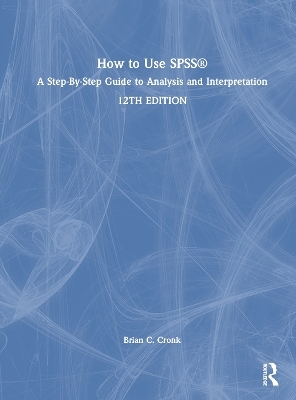
How to Use SPSS®
A Step-By-Step Guide to Analysis and Interpretation
Seiten
2024
|
12th edition
Routledge (Verlag)
978-1-032-58519-2 (ISBN)
Routledge (Verlag)
978-1-032-58519-2 (ISBN)
How to Use SPSS® is designed with the novice computer user in mind and for people who have no previous experience using SPSS. Each chapter is divided into short sections that describe the statistic being used, important underlying assumptions, and how to interpret the results and express them in a research report.
The book begins with the basics, such as starting SPSS, defining variables, and entering and saving data. It covers all major statistical techniques typically taught in beginning statistics classes, such a descriptive statistics, graphing data, prediction and association, parametric inferential statistics, nonparametric inferential statistics and statistics for test construction.
More than 275 screenshots (including sample output) throughout the book show students exactly what to expect as they follow along using SPSS. The book includes a glossary of statistical terms and practice exercises. A complete set of online resources including video tutorials and output files for students, and PowerPoint slides and test bank questions for instructors, make How to Use SPSS® the definitive, field-tested resource for learning SPSS.
New to this edition:
Fully updated to the reflect SPSS version 29. Every screen shot has been recaptured.
New video supplements for all practice exercises.
References to significance levels have been updated to reflect the new SPSS output format.
Effect size is now shown in output for many procedures and reference to some effect size has been moved from Appendix A to be more integrated into the chapters. Sample results sections now also include effect size where SPSS directly calculates effect size.
A new section covering the EXPLORE command has been added to Chapter 3.
The book begins with the basics, such as starting SPSS, defining variables, and entering and saving data. It covers all major statistical techniques typically taught in beginning statistics classes, such a descriptive statistics, graphing data, prediction and association, parametric inferential statistics, nonparametric inferential statistics and statistics for test construction.
More than 275 screenshots (including sample output) throughout the book show students exactly what to expect as they follow along using SPSS. The book includes a glossary of statistical terms and practice exercises. A complete set of online resources including video tutorials and output files for students, and PowerPoint slides and test bank questions for instructors, make How to Use SPSS® the definitive, field-tested resource for learning SPSS.
New to this edition:
Fully updated to the reflect SPSS version 29. Every screen shot has been recaptured.
New video supplements for all practice exercises.
References to significance levels have been updated to reflect the new SPSS output format.
Effect size is now shown in output for many procedures and reference to some effect size has been moved from Appendix A to be more integrated into the chapters. Sample results sections now also include effect size where SPSS directly calculates effect size.
A new section covering the EXPLORE command has been added to Chapter 3.
Brian C. Cronk is Dean of Arts and Sciences, SUNY Buffalo State University USA (PhD in Psychology 1993, University of Wisconsin-Milwaukee).
Preface to the Twelfth Edition 1. Getting Started 2. Entering and Modifying Data 3. Descriptive Statistics 4. Graphing Data 5. Prediction and Association 6. Basic Parametric Inferential Statistics and t-tests 7. ANOVA Models 8. Nonparametric Inferential Statistics 9. Test Construction Appendix A. Effect Size Appendix B. Practice Exercise Data Sets Appendix C. Sample Data Files Used in Text Appendix D. SPSS Syntax Basics Appendix E. Glossary Appendix F. Selecting the Appropriate Inferential Test Appendix G. Answer Key
| Erscheinungsdatum | 17.01.2024 |
|---|---|
| Zusatzinfo | 6 Tables, color; 5 Line drawings, color; 274 Halftones, color; 279 Illustrations, color |
| Verlagsort | London |
| Sprache | englisch |
| Maße | 210 x 280 mm |
| Gewicht | 630 g |
| Themenwelt | Geisteswissenschaften ► Psychologie ► Allgemeine Psychologie |
| Mathematik / Informatik ► Mathematik ► Computerprogramme / Computeralgebra | |
| ISBN-10 | 1-032-58519-6 / 1032585196 |
| ISBN-13 | 978-1-032-58519-2 / 9781032585192 |
| Zustand | Neuware |
| Informationen gemäß Produktsicherheitsverordnung (GPSR) | |
| Haben Sie eine Frage zum Produkt? |
Mehr entdecken
aus dem Bereich
aus dem Bereich
Buch | Softcover (2024)
Hogrefe Verlag
34,95 €


